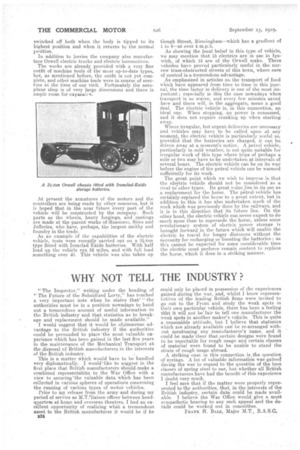WHY NOT TELL THE INDUSTRY?
Page 12

If you've noticed an error in this article please click here to report it so we can fix it.
"The Inspector," writing under the heading of "The Future of the Subsidized Lorry," has touched a very important note when he states that' "the authorities must be in a position nowadays to hand out a tremendous amount of useful information to the British industry and that statistics as to breakage and replacement should be made available."
I would suggest that it would be of /immense advantage to the British industry if the authorities could be persuaded to place the most valuable experience which has been gained in the last five years in the maintenance of the Mechanical Transport at the disposal of British manufacturers in the interests of the British industry.
This is a matter which would have to be handled very diplomatically. I wouldlike to suggest in the first place that British manufacturers should,make a combined representation to the War Office with a view to secuririethe valuable data which has been collected in various spheres of operations concerning the running of varieus types of motoi. vehicles.
Prior to my release. from the army and during my period of service as M.T.Maison officer between headquartess at home and overseas theatres, I had an excellent opportunity of realizing what a tremendous asset to the British manufacturer it would be if he
B31
could only be placed in possession of the experiences gained during the war, and, whilst I know representatives of the leading British firms were invited to go out to the Front and study the weak spots in their own particular vehicle, there has been a feeling thkt it will not be' fair to tell one manufacturer the weak spots in another maker's vehicle. This is quite a reasonable attitude, but I believe that statistics which are already available can be re-arranged without mentioning any manufacturer's name, and it could be made'clear that certain designs were found to be unsuitable for rough usage and certain classes of material were found to be unable to stand the strain of rough usage abroad. A striking case in this connection is the question of springs. A Jot of valuable information was gained during the war in regard to the question of the best classes of spring steel to use, but whether all British manufacturers have had the benefit of this experience I doubt very much. I feel sure that if the matter were properly represented to the authorities, that, in the interests of the British industry, certain data could be made available. I believe the War Office would give a most sympathetic hearing to any such appeal and the details could be worked out in committee.
FRANK E. BALE, Major 111.T.,
























